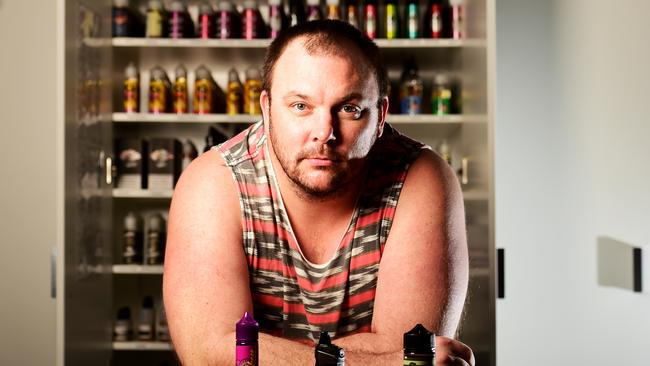Australia’s draconian anti-harm reduction stance will cost lives
For millions of smokers around the world, vaping is a vital tool in enabling them to give up their addiction and a “gung-ho” plan to stop these people will only cost lives, writes Greg Barns.
Opinion
Don't miss out on the headlines from Opinion. Followed categories will be added to My News.
FOR millions of smokers around the world, vaping is a vital tool in enabling them to give up their addiction.
Despite this, in Australia there is an unreasonable, ideological stance taken against it by the Federal Government.
On June 19, it announced that as of July 1 imports of e-cigarettes “containing vaporiser nicotine (nicotine liquids and salts) and nicotine-containing refills” would be prohibited and those caught breaching the law will be fined $220,000.
RELATED NEWS:
- Nicotine e-cigarette ban will see those flouting laws fined $220k
- Australia set to ban import of e-cigarettes and nicotine refills
The only means of accessing vaping products will be via a doctor, who needs to gain permission from health bureaucrats.
But late on Friday, after 30 Coalition backbenchers rightly expressed concern at Mr Hunt’s gung-ho attitude, he agreed to hold off for six months.
Australia’s approach to vaping appears to be driven by a hatred of smokers and smoking. How else to explain the vaping ban? The ABC’s James Purtill observed on Tuesday that while the announcement “has the support of every major public health body, from the Cancer Council to the Heart Foundation to the Royal Australian College of GPs”, by contrast the “UK, Canada and New Zealand are going in the opposite direction; encouraging smokers to switch to vaping as harm reduction. The number of smokers in England is falling. In Australia, it’s going up.”
That trio of countries has some of the best medical and public health policy and research in the world, so the fact they are heading in the opposite direction to Australia is important to note.
Evidence on the benefits of vaping is overwhelming. The National Health Service in the UK says “Many people find e-cigarettes — also known as vapes — helpful for stopping smoking. E-cigarettes aren’t completely risk-free, but they carry a small fraction of the risk of cigarettes. “Quitting with an e-cigarette is particularly effective when combined with expert
face-to-face support.”
A 2018 study from Public Health England, a research body, found “vaping poses only a small fraction of the risks of smoking, and switching completely from smoking to vaping conveys substantial health benefits”, and “e-cigarettes could be contributing to at least 20,000 successful new quits per year and possibly many more”.
In Canada, the Government’s scientific advisory group on vaping heard at its May 2019 meeting from Dr Kenneth Warner, a leading tobacco and nicotine researcher from the University of Michigan. His presentation observed “recent findings from population studies which have, with few exceptions, suggested that vaping may be having a positive influence on smoking cessation at the population level”. Dr Warner also told the meeting, according to the minutes, “that in countries where vaping products are available, the decline in smoking rates have tended to accelerate, in contrast to countries with prohibitive policies on vaping, where declines in smoking seem to have stalled”.

The New Zealand Government’s website notes that the “Ministry of Health released a statement in October 2017 stating that vaping has the potential to help people quit smoking, and contribute to New Zealand’s Smoke-free 2025 goal”.
Sadly Australia is a laggard on drug law reform. Australia’s leading drug addiction doctor Alex Wodak wrote last Friday in the Sydney Morning Herald that he has been involved in drug harm-reduction debates in Australia since the early 1980s.
“Every new harm-reduction intervention met fierce resistance, often lasting years. This happened with methadone treatment for problem heroin users, needle syringe programs to slow the spread of HIV, and drug consumption rooms to reduce drug overdose deaths,” Dr Wodak observes.
So here we go again. But what is so disgraceful about the Australian public health establishment and their captured ministers is their warped ideological opposition to harm reduction — remember they also fought against medicinal cannabis — costs lives and saddles taxpayers with greater health costs.
MORE NEWS:
- Aussie COVID-19 cases surge in new outbreak
- Man arrested after bottle shop car park rampage
- Premier lauds state’s response to COVID-19 pandemic
The result of the July 1 ban will be to create an excellent black market opportunity, with super profits to be made. So crime increases. Then there will be a return to cigarettes. And with that return will come worse health outcomes, which will cost the taxpayers.
As the Australian Tobacco Harm Reduction Association, a group of health professionals who prefer evidence to prejudice, observed last week, the “changes will also make vaping unavailable for Australia’s three million current smokers. It is morally wrong for the Government to deny smokers access to a far safer alternative, which will improve their health.”
As North Sydney MP Trent Zimmerman said last week: “It is inexplicable to me why the Government would act during a pandemic — when all evidence is that smoking increases the health risk for those who catch coronavirus — in a way that could result in more people going back to smoking.”
He is right. Vaping is the humane and rational approach to smoking addiction. The Government should act accordingly. Let’s hope the six-month delay becomes permanent.
Hobart barrister Greg Barns, SC, is a human rights lawyer.


